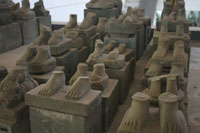Reviving Heaven: The Preservation of Angkor

|
|
Audio Slideshow | Posted Feb 26, 2009
Program: Exposure
Kyle Chayka
Siem Reap, in the North of Cambodia, is a city with a surfeit of history. Before the Khmer Rouge, before the French, there was the civilization of Angkor, at its height over 700 years ago. Remembered the world over for the construction of Angkor Wat, the largest religious monument on Earth, Angkor still persists in the Cambodian identity. It lives on in the scarred stone faces of the Buddha figures crowding the walls of Angkor’s temples, today massive tourists attractions. Angkor lives on in the headless sculptures, victims of looting, forever standing guard in a storehouse rarely visited by foreigners. Yet for all its omnipresence, Angkor is still in danger of being entombed by the past, its temples toppled by looters and trampled by tourists. Through reconstruction, preservation, the opening of a brand new art museum, and the work of thousands of dedicated individuals, Cambodians have found a path to preserve both the history as well as the living reality of Angkor while leaving the wonder of the place itself intact.
Siem Reap, in the North of Cambodia, is a city with a surfeit of history. Before the Khmer Rouge, before the French, there was the civilization of Angkor, at its height over 700 years ago. Remembered the world over for the construction of Angkor Wat, the largest religious monument on Earth, Angkor still persists in the Cambodian identity. It lives on in the scarred stone faces of the Buddha figures crowding the walls of Angkor’s temples, today massive tourists attractions. Angkor lives on in the headless sculptures, victims of looting, forever standing guard in a storehouse rarely visited by foreigners. Yet for all its omnipresence, Angkor is still in danger of being entombed by the past, its temples toppled by looters and trampled by tourists. Through reconstruction, preservation, the opening of a brand new art museum, and the work of thousands of dedicated individuals, Cambodians have found a path to preserve both the history as well as the living reality of Angkor while leaving the wonder of the place itself intact.

